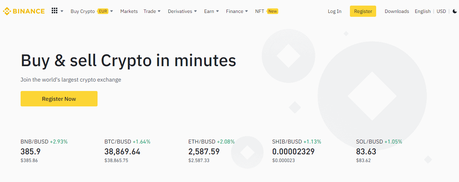If you're new to the cryptocurrency world, you may be wondering what the best way to store your coins is. In this article, we'll compare Ledger vs Binance wallets and help you decide which one is right for you.
Both wallets have their pros and cons, so read on to find out more!

A ledger wallet is a digital wallet that allows you to store, receive, and send cryptocurrency. Ledger is a hardware wallet that provides extra security by storing your private keys offline.
This means that even if your computer is hacked, your coins are safe. It also allows you to make transactions without revealing your identity, which makes it perfect for those who value privacy.
In addition, ledger wallets are easy to use and come with a user-friendly interface. They are also compatible with multiple cryptocurrencies, which makes them ideal for those who invest in multiple coins.
Overall, ledger wallets are a great choice for those who want to keep their coins safe and secure.

Binance is a cryptocurrency exchange that launched in July 2017. The company is based in China but has offices around the world, including in Japan, Korea, and the United States.
Binance is one of the largest cryptocurrency exchanges by trading volume and has over 100 different cryptocurrencies available for trading.
The company has a mobile app that allows users to trade on the go, and it also offers margin trading and lending products. Binance is one of the few exchanges that has not been hacked, and it has a good reputation for security and customer service.
In addition, the company offers a variety of features, such as a referral program and a staking program, that make it an attractive option for cryptocurrency traders.
Cryptocurrency wallets come in many different forms, each with its own set of features and benefits. While there are many wallets on the market, two of the most popular are Ledger and Binance.
Both wallets offer great security and a host of other features, but there are some key differences between them. Ledger is a hardware wallet that stores your private keys offline, meaning that your coins are completely safe even if your computer is hacked or infected with malware.
Binance, on the other hand, is a software wallet that stores your private keys online. This makes it more convenient to use, but it also means that your coins are at risk if Binance is hacked.
In terms of security, then, Ledger is the clear winner. However, Binance offers some unique features that Ledger doesn't, such as a built-in exchange and support for a wide range of coins. As a result, which wallet you choose will ultimately come down to personal preference.
A ledger wallet is a popular choice for cryptocurrency investors, offering security and convenience. However, there are some pros and cons to consider before using a Ledger wallet.
- Ledger wallets are very secure, as they use a hardware device that stores your private keys offline. This means that your coins are less vulnerable to hacking and theft.
- Another benefit is that Ledger wallets support a wide range of cryptocurrencies, so you can manage all your investments in one place.
- However, one downside of Ledger wallets is that they can be expensive, especially if you need to purchase multiple devices to support all your currencies.
- Additionally, Ledger wallets can be complicated to set up and use, so they may not be ideal for beginners.
Overall, Ledger wallets offer a high degree of security and convenience, but they come at a cost.
Binance is one of the most popular cryptocurrency wallets, offering a number of features that appeal to users.
- One of the advantages of Binance is that it supports a wide range of cryptocurrencies, making it a convenient option for those who hold multiple types of digital assets.
- Additionally, Binance offers some unique features, such as a built-in exchange and support for margin trading.
- However, there are also some potential drawbacks to using Binance. For example, the platform has been known to be unstable at times, and users have reported losing funds due to hacks and other security issues.
Overall, Binance is a convenient and feature-rich option for many cryptocurrency users, but it is not without its risks.
When it comes to cryptocurrency, there are a variety of different wallets that investors can choose from. However, two of the most popular options are Ledger and Binance.
Both wallets offer a variety of features and benefits, so choosing the right one can be daunting. When comparing Ledger and Binance, it is important to consider security, fees, ease of use, and supported currencies.
Ledger is widely considered to be one of the most secure wallets on the market, while Binance offers a more user-friendly interface. In terms of fees, both wallets charge a small percentage for each transaction.
However, Binance also charges a listing fee for new coins, while Ledger does not. When it comes to supported currencies, Binance offers a broader range of options than Ledger.
However, both wallets support major coins such as Bitcoin, Ethereum, and Litecoin. Ultimately, choosing the right wallet depends on the individual investor's needs and preferences.
Quick LinksWhen it comes to cryptocurrency wallets, there are a few popular options to choose from. In this article, we've compared the Ledger vs Binance wallets.
We looked at the features of each wallet and how they compare.
Overall, both wallets have their pros and cons, but we think the Ledger Nano S is a better option for most people. If you're looking for a reliable and secure crypto wallet, the Ledger Nano S is a great choice.
